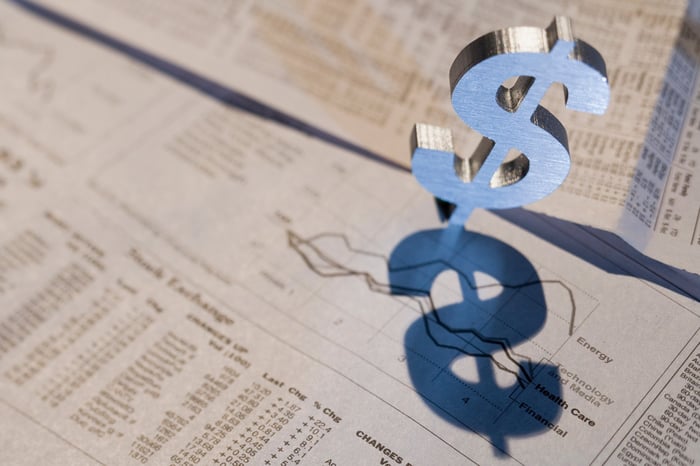Although Wall Street offers few guarantees, short-term volatility is one of them. Since the curtain opened on 2020, Wall Street's three major stock indexes have traded off bear and bull markets in successive years (through 2023).
When equities are getting whipsawed by uncertainty, it's not uncommon for professional and retail investors to seek the safety of industry-leading stocks, such as the companies that make up the "Magnificent Seven."

Image source: Getty Images.
Patient investors have gravitated to the "Magnificent Seven"
The Magnificent Seven are seven of the largest and most influential publicly traded companies. Listed in descending order of current market cap (as of April 5, 2024), these seven titans are:
- Microsoft (MSFT -1.00%)
- Apple (AAPL 2.48%)
- Nvidia (NVDA 0.03%)
- Amazon (AMZN 0.75%)
- Alphabet (GOOGL -3.37%) (GOOG -3.33%)
- Meta Platforms (META -2.41%)
- Tesla (TSLA 15.31%)
There are two defining traits that have made the Magnificent Seven such popular holdings for investors. To start with, they're undeniable outperformers. Over the trailing decade, the benchmark S&P 500 has gained a rock-solid 182%. Comparatively, Nvidia's stock has zoomed higher by approximately 19,230%, the shares of Amazon and Tesla have gained more than 1,000%, and Alphabet is bringing up the caboose with a gain of "only" 464% from its Class A shares (GOOGL).
The other reason investors have flocked to the Magnificent Seven is because they all offer clearly defined competitive advantages or seemingly impenetrable moats.
- Microsoft's cloud infrastructure service platform Azure ranks second in global market share. Meanwhile, Windows remains the clear leader in desktop operating systems.
- Apple's iPhone has accounted for a 50% or greater share of the domestic smartphone market since introducing 5G-capable versions in 2020. Apple also has the largest share repurchase program on Wall Street.
- Nvidia's graphics processing units (GPUs) are powering the artificial intelligence (AI) revolution. The company's A100 and H100 GPUs are expected to account for a 90% share of the GPUs deployed in AI-accelerated data centers this year.
- Amazon sits at the top of the pack in e-commerce and among cloud infrastructure service platforms. Its e-commerce marketplace oversaw nearly 38% of U.S. online retail sales in 2023, while Amazon Web Services (AWS) gobbled up a 31% share of worldwide cloud infrastructure service spending in the September-ended quarter.
- Alphabet's Google has a virtual monopoly in global internet search, with a 91% share in March 2024. Alphabet is also the parent of the second-most-visited social network (YouTube) and the world's No. 3 cloud infrastructure service platform (Google Cloud).
- Meta Platforms' social media networks attracted nearly 4 billion monthly active users (MAUs) during the December-ended quarter. This includes Facebook, which alone lured in 3.07 billion MAUs.
- Tesla is North America's leading electric vehicle (EV) maker and the only pure-play EV manufacturer that's been generating a recurring profit. Last year, Tesla produced almost 1.85 million EVs.
Billionaire investors have been selling all but one of the "Magnificent Seven" stocks
But in spite of the overwhelming success of the Magnificent Seven, many of Wall Street's most prominent billionaire investors began kicking these outperformers to the curb during the December-ended quarter.
All told, six of the seven Magnificent Seven stocks were either jettisoned from billionaires' portfolios or meaningfully pared down, including:
- Nvidia: Eight highly successful billionaire money managers reduced their positions in this AI titan, with Israel Englander of Millennium Management (1,689,322 shares sold), Jeff Yass of Susquehanna International (1,170,611 shares sold), and Steven Cohen of Point72 Asset Management (1,088,821 shares sold) leading the way.
- Microsoft: Seven accomplished billionaires were sellers of Microsoft stock in the December-ended quarter, including Ole Andreas Halvorsen of Viking Global Investors (3,024,399 shares sold) and Jim Simons of Renaissance Technologies (1,155,782 shares sold), who both closed out their respective funds' positions.
- Alphabet: Seven top-tier billionaire asset managers dumped shares of Alphabet during the fourth quarter. Coatue Management's Philippe Laffont (3,302,342 shares sold), Lone Pine Capital's Stephen Mandel (3,113,001 shares sold), and Tiger Global Management's Chase Coleman (1,278,300 shares sold) were the respective top sellers.
- Meta Platforms: Six tenured billionaires gave shares of Meta the boot in the quarter ended in December. The top sellers included Jeff Yass of Susquehanna (3,037,082 shares sold) and Chase Coleman of Tiger Global (1,430,767 shares sold).
- Apple: Four respected billionaire money managers reduced their stakes in Apple during the fourth quarter. This included Warren Buffett of Berkshire Hathaway, who oversaw the sale of a little over 10 million shares of Apple.
- Tesla: A total of three well-known billionaire investors sold shares of EV maker Tesla in the final quarter of 2023. Billionaires John Overdeck and David Siegel, who co-founded Two Sigma Investments, saw their funds sell all 1,015,385 shares of Tesla they'd owned as of the previous quarter.
The one name missing from this list, and the only Magnificent Seven stock that billionaires are absolutely piling into, is e-commerce behemoth Amazon. During the fourth quarter, eight billionaires added shares of Amazon to their respective funds, including (total shares purchased in parenthesis):
- Ken Griffin of Citadel Advisors (4,321,477 shares)
- Jim Simons of Renaissance Technologies (4,296,466 shares)
- Chase Coleman of Tiger Global Management (947,440 shares)
- Ken Fisher of Fisher Asset Management (888,369 shares)
- John Overdeck and David Siegel of Two Sigma Investments (726,854 shares)
- Steven Cohen of Point72 Asset Management (462,179 shares)
- Israel Englander of Millennium Management (85,532 shares)

Image source: Getty Images.
Here's why billionaire investors can't stop buying Amazon stock
If you're wondering why billionaires are buying shares of Amazon stock while paring down or exiting their stakes in the other Magnificent Seven stocks, look no further than Amazon's trio of fast-growing ancillary operating segments: AWS, advertising services, and subscription services.
Although most people are familiar with Amazon because of its leading online marketplace, e-commerce generates very low margins. The bulk of the cash flow and operating income Amazon produces come from its trio of ancillary segments.
None of these segments is more important than AWS. Enterprise cloud spending is still relatively early in its ramp, which suggests sustained double-digit sales growth should be the expectation for AWS. Even though this segment only accounted for a sixth of Amazon's net sales last year, it provided about two-thirds of its operating income.
Amazon's advertising operations are another source of sustained growth. In a typical month, Amazon's website is the destination for well over 2 billion visitors, many of whom are motivated shoppers. This makes Amazon one of the primary platforms that merchants want to target when getting their message(s) in front of consumers.
The third key operating division is subscription services. The last time Amazon updated its global Prime subscription count was April 2021, when then-CEO Jeff Bezos announced the company had surpassed 200 million. With Amazon gaining the exclusive streaming rights to Thursday Night Football, there's a high likelihood this subscription total has jumped further.
Collectively, the lure of these higher-growth segments is their cash flow generation. Throughout the 2010s, investors comfortably paid a multiple of 23 to 37 times year-end cash flow to own shares of Amazon stock. Patient investors can purchase shares of Amazon right now for just 13 times consensus cash flow in 2025. Even approaching its previous all-time high, Amazon stock is historically inexpensive.






